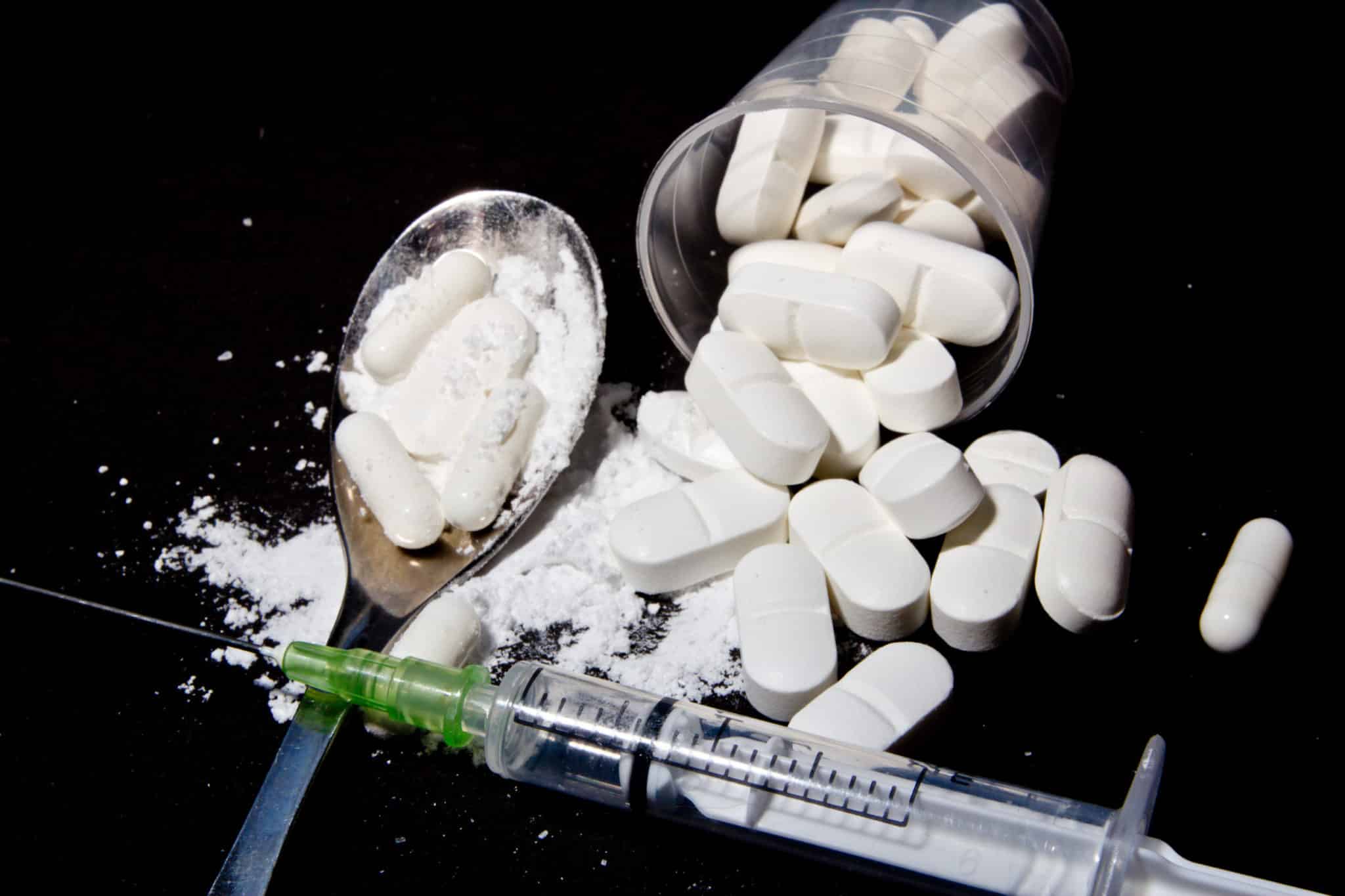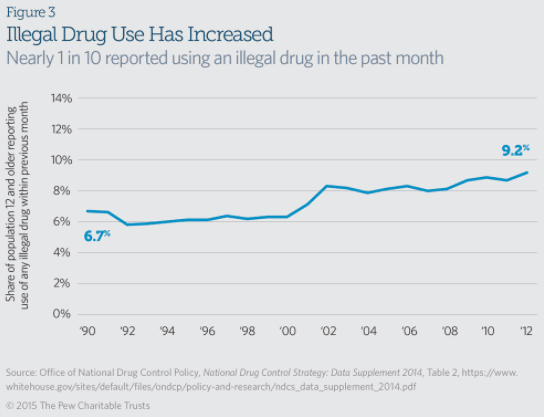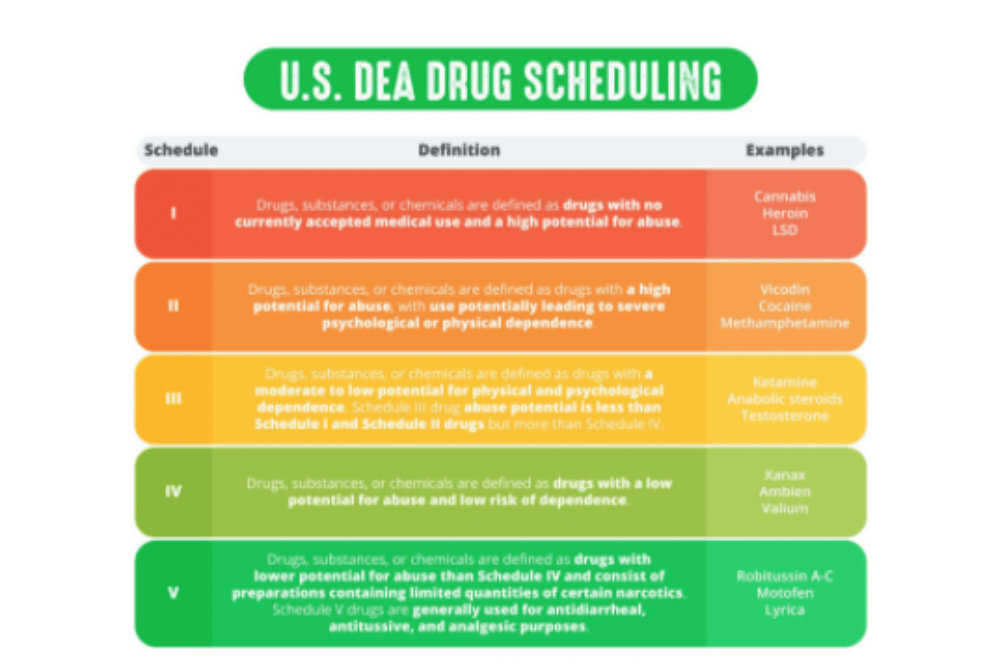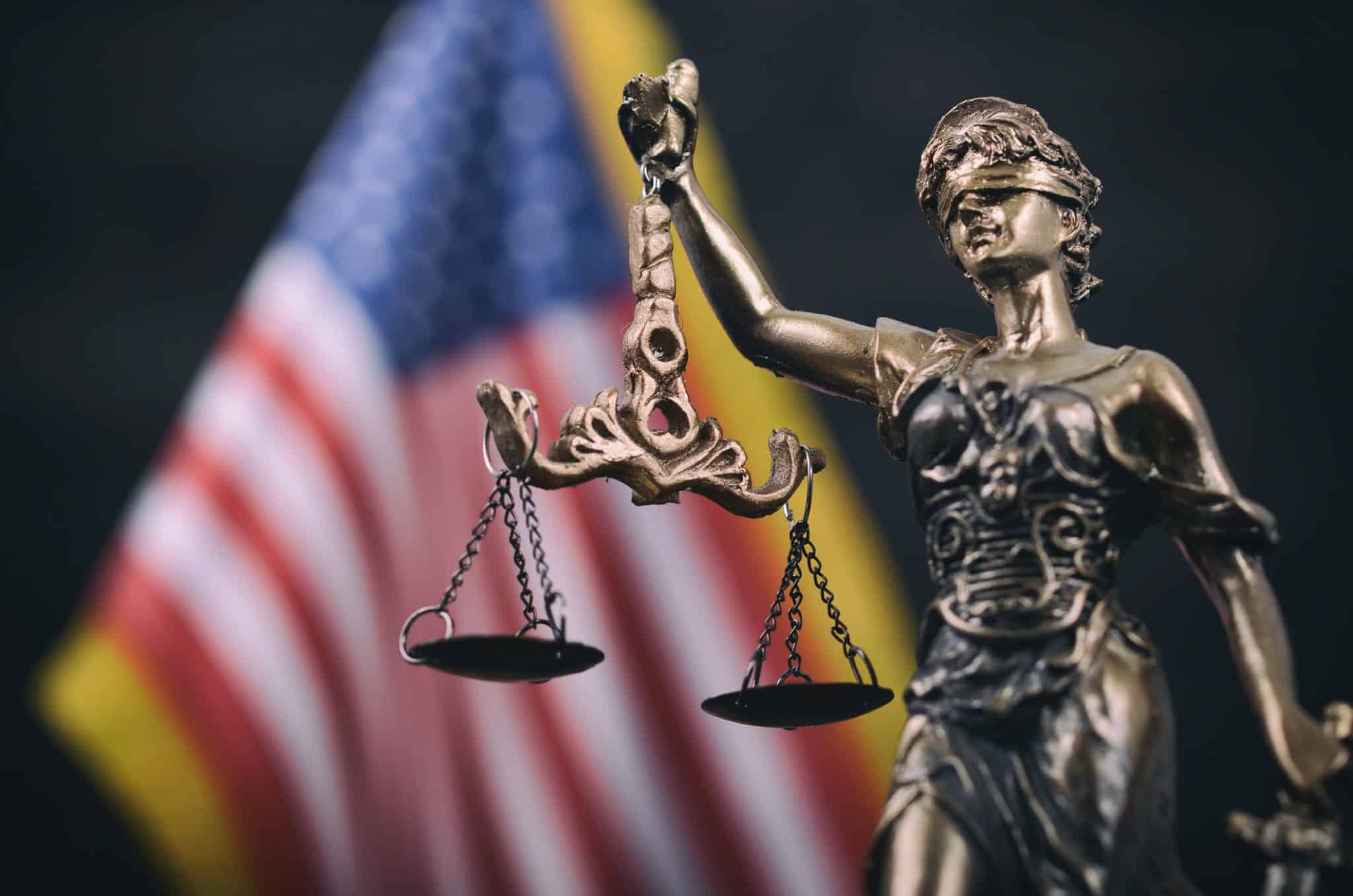The federal government takes drug crimes very seriously. Federal prosecutors go to great lengths to make sure that possession, manufacture, and trafficking of drugs offenses receive the most severe sentence allowable under the law and the U.S. Sentencing Guidelines.
Many states have their own drug laws, but federal drug laws supplant state laws, even in states where marijuana has been made legal for medical or recreational purposes.
Here is a comprehensive guide to federal drug crimes, which will hopefully give you a better understanding of what federal laws say about drugs, how different substances are viewed under those laws, and the consequences a person can face if they are found guilty of violating those laws.
Federal Drug Laws
The federal government has created laws to control how people use, possess, distribute, and manufacture drugs, both legally and illegally. The federal agencies tasked with enforcing these laws work extensively with local and state law enforcement. They help ensure the laws are enforced effectively and that substances deemed a danger to the public are under effective control.
Most of the time, federal drug enforcement agencies focus on the trafficking of drugs, but people can be arrested and and prosecuted for other drug-related offenses under federal law.
The Federal Controlled Substances Act
Most states, including Texas, have their own controlled substances acts, but the federal government has enforced the Comprehensive Drug Abuse Prevention and Control act of 1970 since it was passed. Under this larger act, the federal Controlled Substances Act was born, which grants federal jurisdiction over certain drugs, chemical substances, and plants. It also established a scheduling or classification system for drugs.
Under the Controlled Substances Act, there are several things that are considered when drugs are placed into certain schedules including:
- The potential the drug has for abuse
- If it has any scientifically established medical use
- The history of the drug
- The observed patterns of its abuse
- How widespread the abuse of the substance is
- What public health risks exist due to the drug
- How likely the drug is to cause dependence – either psychological or physical
It also considers if the substance comprises part of making another controlled substance.
Anti-Drug Abuse Acts of 1986 and 1988
The above graph demonstrates the rising rates of illegal drug use, in spite of the creation of anti-drug abuse acts in the late 1980s.
The Anti-Drug Abuse Act of 1986 permits the Controlled Substances Act to include substances that are considered similar to other controlled substances in the drug schedule. These drugs are also known as synthetic drugs.
The 1986 Act also established mandatory minimum sentencing for federal drug crimes. It addressed the differences between crack cocaine and powdered cocaine in relation to how much of the substance a person must possess in order to be subject to mandatory minimum sentencing.
The 1986 Act was passed to help reduce the demand and availability of certain substances. The Act also created the Office of National Drug Control Policy whose director is often referred to as the drug czar.
It is responsible for placing mandatory minimum sentences on minors who are involved in drug crimes, as well as creating criminal penalties for violating the law on federal lands.
Finally, this Act also produced the Chemical Diversion and Trafficking Act to help reduce the availability of certain chemicals used in the manufacturing process of certain controlled substances.
Federal Drug Schedules
One of the most important things to understand about federal drug crimes deals with the drug schedules on which they are based. According to the Drug Enforcement Agency, substances, drugs, and other chemicals used to produce drugs are placed into five separate schedules. The schedule in which a drug is placed depends on a few factors, such as the potential the drug has to produce abuse or dependency – and if there are any accepted medical uses for the drug.
In the graph below, you can see the five schedules match with the various types of drugs placed into them.
The five federal drug schedules are:
Schedule I
The substances on this schedule, the most serious, have no present accepted medical use. They are also considered substances with a high potential for dependence and abuse. Substances on this schedule include LSD, heroin, ecstasy, peyote, methaqualone, and marijuana.
Schedule II
The substances on this schedule have a high potential for dependence and abuse. They are considered dangerous, but they also have some accepted medical use. Substances on this schedule include cocaine, Ritalin, fentanyl, hydromorphone, oxycodone, methadone, methamphetamine, and Adderall.
Schedule III
The substances placed on this schedule have a moderate or low potential for dependence and abuse, or at least less than those substances found on Schedule I and Schedule II. Substances found on this schedule include ketamine, testosterone, anabolic steroids, and some medications containing codeine.
Schedule IV
Substances on Schedule IV are those with a low risk of abuse and dependence which also have an established medical use. Substances on this schedule include Valium, Tramadol, Xanax, Ativan, and Ambien.
Schedule V
The substances on this schedule have a low potential for abuse and usually consist of substances that are preparations containing narcotics. This includes substances such as cough syrups with codeine, Lyrica, and Lomotil.
Federal Drug Crimes
What types of crimes can a person be charged with under federal law? There are several. They include:
Possession of a Controlled Substance
Possession is divided into two separate categories: Simple possession and possession of a substance with the intent to distribute.
Simple possession is the type of possession a person can be charged with if they are found to have small amounts of outlawed substances on them for personal use.
Possession of a substance with the intent to distribute happens when someone is caught with a certain quantity of drugs broken down into smaller amounts. It often includes the possession of other indicators of distribution, such as a large amount of cash or scales.
Federal Drug Distribution
Federal drug distribution, also known as trafficking, includes the acts of transporting, smuggling, or selling drugs. The drugs involved can either be illegal substances outright or prescription drugs that are intended to be distributed illegally.
It is a felony to traffic drugs in the United States. The penalties faced depend on:
- The drugs involved
- What schedule they’re on
- How much a person is accused of trafficking
- Where the drugs are being trafficked
- Where the person is arrested
- If there was an intention for the substances to be distributed to minors
Federal Drug Manufacturing
A person can be accused of federal drug manufacturing if they are involved in any step of the process to produce an illicit substance. This can include the sale of substances used to manufacture the drugs or manufacturing equipment. It also includes assisting in the actual production process.
It’s important to note that growing marijuana is considered drug manufacturing under federal law, as is producing methamphetamine. And, if a person is caught manufacturing illegal substances near playgrounds or schools, then they face harsher penalties.
Federal Drug Crime Sentencing
When it comes to federal drug crime sentencing, it’s vital to understand that federal judges in these cases are required to impose a minimum sentence for anyone convicted of a federal drug crime. This is called a mandatory minimum sentence.
Examples of the mandatory minimums that are imposed in the federal system include:
- 90 days imprisonment for simple possession of a controlled substance with two or more prior convictions
- One year imprisonment for the distribution of a controlled substance near a school unless another minimum sentence applies
- 5 years imprisonment for trafficking 100 grams of a substance on Schedule I
- 10 years imprisonment for those found guilty of trafficking at least one kilo of a Schedule I substance
- 10 years imprisonment for a repeat offender
- 20 years imprisonment in cases where serious injury or death occurred
- 20 years imprisonment if there are any prior felony drug convictions on a person’s criminal record
- Life imprisonment if there is a prior felony drug conviction on a person’s criminal record that involved serious injury or death – or they have two or more felony drug convictions
Possession Penalties
In most cases, simple possession under the federal system will result in 365 days in jail and fines of at least $1,000. However, being found guilty for the second time of simple possession can result in two years imprisonment and fines of at least $2,500. After that, other simple possession convictions can result in three years imprisonment with a minimum fine of $5,000.
Drug Trafficking Penalties
The minimum penalty a judge can impose for federal drug trafficking depends on the substance involved and its quantity. For example, someone found with between 100 and 999 kilograms of marijuana faces at least five years imprisonment but can be sentenced to up to 40 years.
A past criminal history is also taken into account, as well as facts regarding if anyone was injured or killed in the commission of the crime. This is one of the many reasons why anyone facing federal drug trafficking charges needs an experienced attorney on their side to help represent them in court.
Drug Manufacturing Penalties
A felony offense, federal drug manufacturing can result in significant prison sentences. One year of imprisonment is the minimum in the least serious cases, with 10 years or more being handed out in more serious cases. Fines imposed can go as high as $50,000 – or even more.
Defenses Against Federal Drug Crimes
If you are facing federal drug crimes, then it’s important that you hire an attorney with experience to help represent you and to ensure you mount an appropriate defense. Remember, the federal government has a lot of resources available to prosecute and investigate a case, so you need representation of your own to help get you the most favorable outcome possible.
Every case is different, but, in general, there are some common ways a person can defend themselves against federal drug charges. The most common defenses include:
Violation of Constitutional Rights
If your case involved a violation of your constitutional rights, particularly a violation of your Fourth Amendment rights against illegal search and seizure, then you can use that as a defense in court. Law enforcement officers, even federal ones, must have probable cause to search you and your property. If they did not have probable cause or a warrant to search you, then the evidence gathered through an illegal search and seizure can be thrown out.
Sometimes, that undermines the entire case of the government. In the best scenario, the whole case can be thrown out and charges dropped. Remember, your constitutional rights are important, and no one has the ability to violate them, including the federal government.
The Drugs Weren’t Yours
If you can prove that the drugs you were accused of possessing, manufacturing, or trafficking were not yours, and you had no intention of breaking the law, then that’s a viable defense. Bring facts like this to the attention of your attorney so they can explore this as a possible defense to the charges of your cases and build a good strategy to prove your innocence in court. It’s always vital to be 100 percent honest and upfront with your attorney – remember, the things you tell them are privileged, so it’s OK to let them know everything about your situation. Doing so will help you gain the best outcome.
 Federal drug crimes are serious and can gravely impact your life forever. Being found guilty may not only send you to prison for years – it can also change your future long after prison. It can jeopardize any professional license you have, make it impossible to get federal loans for schooling, make it more difficult to get a job, and even make it harder to find suitable housing. You do not want this blemish on your record. Make sure to seek out an experienced and effective attorney as soon as possible if you are being charged with federal drug crimes.
Federal drug crimes are serious and can gravely impact your life forever. Being found guilty may not only send you to prison for years – it can also change your future long after prison. It can jeopardize any professional license you have, make it impossible to get federal loans for schooling, make it more difficult to get a job, and even make it harder to find suitable housing. You do not want this blemish on your record. Make sure to seek out an experienced and effective attorney as soon as possible if you are being charged with federal drug crimes.











